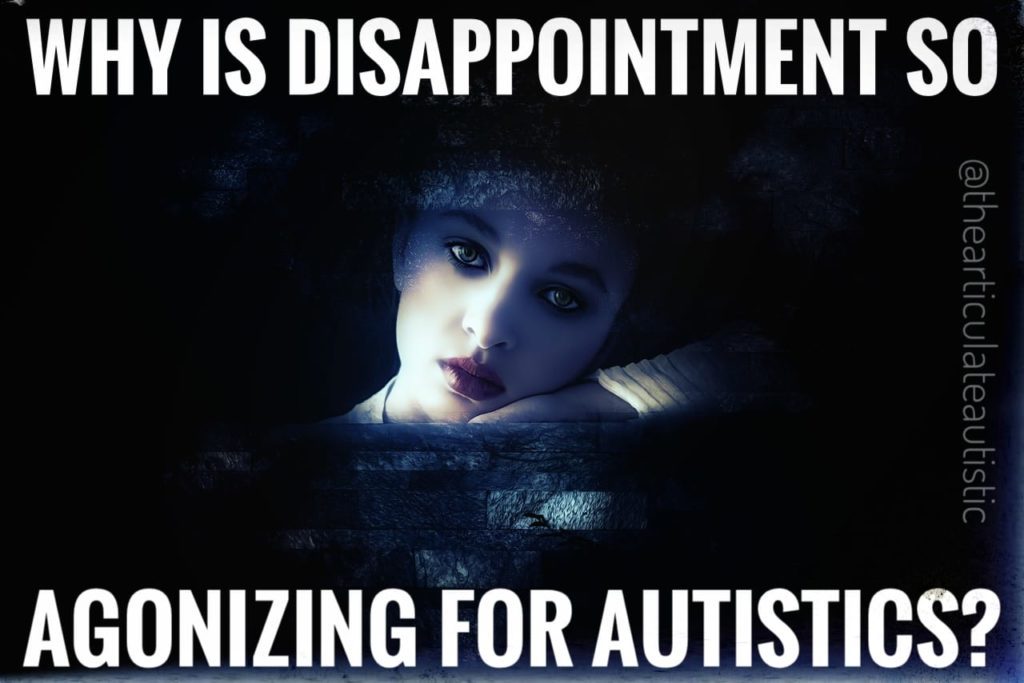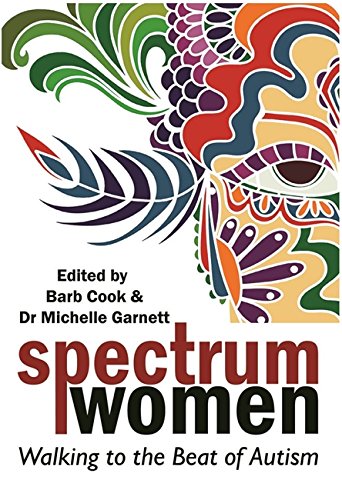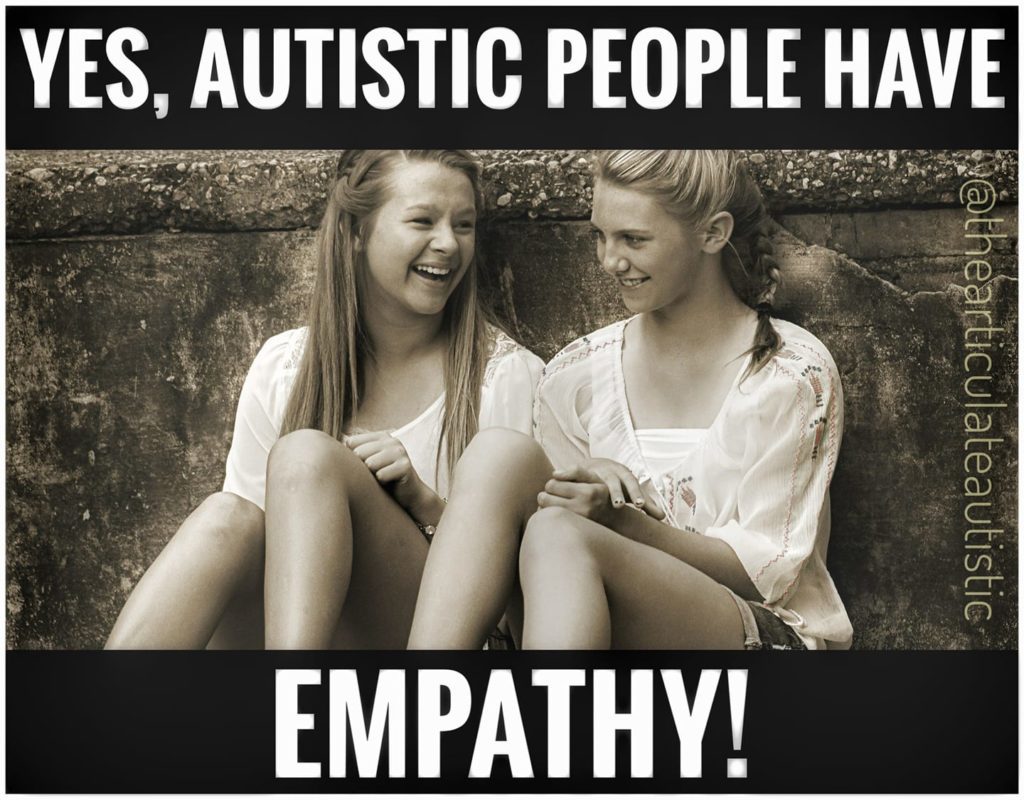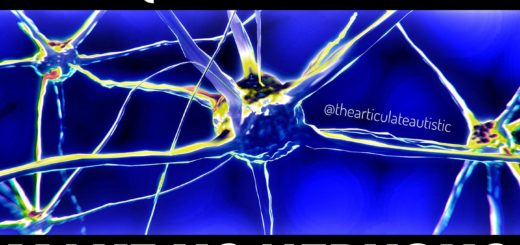Why Is Disappointment so Agonizing for Autistics?

Why is disappointment so agonizing for autistics?
This blog post is part question, part theory.
I know from my own experience that when something does not happen the way we expect it to happen, it is practically physically painful for us.
Example:
You said you wanted to get together for lunch, and we spent the week emotionally preparing ourselves for the social interaction, and, last-minute, you decide to go see a movie with your cousin who just unexpectedly arrived in town.
Once we get the text or call that the activity we had planned isn’t going to happen, we don’t know what to do with ourselves.
– Jaime A. Heidel – The Articulate Autistic
See, we thrive on doing things in order. A, B, C, D, in exactly that order. If A doesn’t happen, we can’t easily move on to B.
We can’t skip over or delay A because our thoughts and way of navigating the world demand this order.
Can we move on? Eventually, yes, but something that seems like only a minor inconvenience to a neurotypical (non-autistic) person (like rescheduling lunch plans) may be both cognitively and emotionally devastating to an autistic person.
It’s like we get stuck and have no idea what to do with ourselves. It’s like we tried to turn the page to the next chapter of a book and found it blank!
Another thing I’ve noticed is that neurotypical (NT) people seem to make social promises that are mutually understood by NT people as social graces and not meant to be taken seriously!
Stuff like “We should get together” or “If there’s anything I can do” rarely means those exact things. It’s very similar to “Hello” and “How are you?” Nobody expects the truth, it’s just social etiquette.
Things like this confused and hurt me deeply when I was younger because I took everything said to me completely literally.
(Article continues below.)
The best way to improve communication with your autistic loved one is to understand how your autistic loved one’s mind works! Intentions, motivations, and personal expressions (facial expressions or lack thereof, body language, etc.), are often quite different in autistic people than they are in neurotypical people.
Experience a better understanding of your autistic loved one by reading books about life from an autistic perspective as well as stories that feature autistic characters. You’ll have so many “Ah ha!” moments and start seeing your autistic loved one in a different light (and you’ll have a better understanding of their behaviors, which you may have been misinterpreting up until now).
Books I recommend for a better understanding of your autistic loved one:
Example from my life:
Nearly 20 years ago now, I actually got ready for a date once because someone I was casually seeing said they might like to go out that coming weekend.
We had no further discussion about it and didn’t talk at all during the week, but I got ready and waited and waited for her to pick me up at the time we’d agreed upon, but she’d gone out to meet friends without me.
It meant absolutely nothing to her, but I told her never to call me again because I couldn’t trust her. And I ended a lot of budding friendships that way until I knew I wasn’t being betrayed, I was just misunderstanding.
Granted, I still don’t see the logic in making what I refer to as “fake promises”, but I’ve learned through painful disappointment and embarrassment that this is just the way the neurotypical world seems to work, and, since it’s mutually understood between NT people, they don’t get offended or hurt nearly as easily when things don’t go as “planned” because there were never any real plans to begin with.
Does your autistic loved one appear to be “all or nothing” with emotions? Either seeming completely disconnected or painfully emotional with no in between? It’s not drama, it’s not exaggerated, it’s autistic empathy. Click on the photo below to learn more about autistic empathy.
Follow me on Instagram.
Want downloadable, PDF-format copies of these blog posts to print and use with your loved ones or small class? Click here to become a Patreon supporter!








The website looks great, Jaime! I can relate to what you wrote about a friend standing you up. This has happened to me recently with the same friend 3 times in a row, only in this case the plans were definitely understood and my friend decided a few days prior to the day of to tell me (only when I asked) they had changed their plans. She said she was sorry when I said it looked like it might be several months until that expo we used to go to comes around again, but made no move to set up anything else on another day with me, just said it was a “busy” time. We’re all busy, it’s just a matter of WHAT and WHOM we’re busy with. That is a conscious choice.
I’ve noticed that neurotypical people seem to go through a honeymoon period of friendship in which they’re excited to spend time with you but then often lose interest over time and withdraw their investment in the relationship, meanwhile the autistic person is kind of left holding the bag and still is as committed as they were in the beginning.
Although it’s predictable now it doesn’t get any easier to take when you feel like you’re a low priority on their list and they don’t value the friendship enough to spend time with you and to WANT to spend time with you.
When I make plans with someone that timeslot is filled…period. I don’t look for a better offer and then later imply to somebody I’d rather do this new thing with someone else that just came up. Instead, I tell the second person I already have plans for that day but that I’d like to do that activity on some other day, and I keep the plans I made first.
Neurotypical people may think they’re being polite by being disingenuous, but they are actually being rude, and disrespectful of the person they made plans with first if they had no intention of following through.
If they decided later they really didn’t feel like doing the activity we had planned then I would rather they say that so that we could choose something we both want to do rather than their cutting me out altogether. Otherwise it just leaves me thinking it’s me; that they just don’t want to spend time with me at all.
Honestly, I don’t blame you for being pissed for being stood up. That person who’d led you to believe she wanted to see you that weekend didn’t just sit home that day but chose to get together with other friends instead, so she must have been serious about going out with somebody!
I haven’t had to guts yet to ask my friend if over the 4 months she’s not been getting together with me she’s been doing stuff with other friends aside from her husband, but am thinking of a way to talk to her about this. I feel like saying to her “I feel like you don’t like me so much anymore” or “I feel like you’ve lost interest”, or “I’ve noticed you have pulled back alot in this friendship and have stopped doing what you were doing in the beginning and are less involved in my life”. It wouldn’t be so great to hear she’s not that into me anymore, but at least I would know where I stood and wouldn’t feel like I had to do all the work to nurture the relationship it takes 2 to make work and then I could choose to pull back too. Even so, each one of these experiences leaves me less trustful about making new friends, and have less faith in humanity.
Maybe it’s not just about neurological differences. It may be in large part how society has encouraged people in the last 20 years to cloister themselves between who they live with and work with and separate themselves from anyone outside that except for being “ships passing in the night” so to speak.
There seems to be a sociological aspect to it. Back in the 60s and 70s it was much more common for friends to get together several times a week and spend alot of time in each others’ life. Social media has in large part replaced in-person relationships and maybe alot of people find that more convenient and they don’t miss real face to face friendships. I don’t know, but it seems that way from what I’ve observed. It’s kind of sad.
You’re so right that missing somebody is a part of empathy. If it bothers you not to spend time with someone then that is evidence that you feel fondness for them, (the lack of which would be a lack of empathy). We can’t forget about people we have warm feelings towards because by definition that means that we do think about them when they’re not in the same room. Cool or coldness is opposite of that and indicates a lack of (or a waning of) attachment. In many ways I think we who are autistic have MORE empathy.
One of the reasons why disappointment is so agonizing for many autistic individuals is the inability to often see other alternatives, along with fear of failure
One thing-when someone says they MIGHT want to do something, that by nature, means it’s not guaranteed. That’s why it’s important to listen for subtle words like that. And then follow up first maybe the day before if possible. You know, ask them if it’s still on instead of just assuming that it is.
I’ve never liked it when they treat plans as if they’re a casual thing and then turn around, get p.o.’d at and avoid you when you thought that they actually meant it. That happened to me once in college. I’d been having some great conversations with this one girl and she and one of her friends went around the dorm inviting people to a bunch of pool games and stuff either that or the next night and told me to be there or else. Or, at least that’s what I thought that they were implying by their emphasis. But when I got there at what I thought was the appointed time, I couldn’t find either of them or anything like the get-together they proposed going on at all. I later spotted the girl I’d been talking to in the cafeteria and she apologized and said that she went out to eat at Subway or something. But she seemed rather p.o.’d at and uncomfortable with me for reasons that I couldn’t fathom at that time. So I just declared her a complete loss after that.
That’s why I just don’t bother with people I don’t know well most of the time.